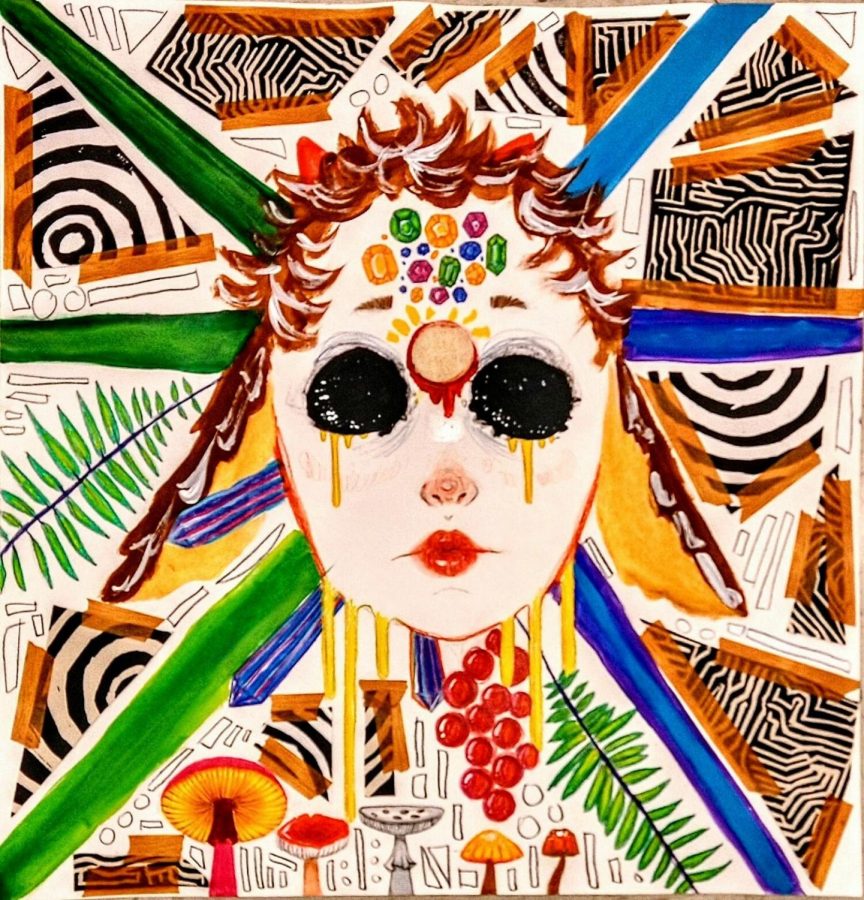A Half Identity: Proving I’m Enough
‘Blood and Body” is a piece about trying to fit in with a religion that I don’t find myself resonating with and the struggles that come upholding family values and cycles.” -Millie Gotsch
December 16, 2021
This article can also be found in the exclusive December print edition focused on Chamblee’s Identity. Copies of the newspaper are being distributed at lunch Thursday, December 16.
I grew up in a Catholic family, with a white father and a Hispanic mother. I went to public school, rode the bus, hung out with friends, and did normal childhood activities. And while I was learning to play instruments, draw, paint, and expand myself creatively, I was also growing physically older.
My personality and body have learned to grow together, and incidentally I learned to identify myself. Putting labels on what you are can be mentally taxing, but at some point it is going to be asked of you. Having to change your identity based on what others want you to be is also a struggle that I face, as some people bring out different parts of you. How can you gain an identity? And for me, the question is how can I prove that I’m Hispanic enough?
Am I really Hispanic? With the way I’ve grown up, it feels like a lie. Based on my physical appearance, which I cannot change, I always am assumed to be fully white. I treat myself the same way as well. I know that I am part Venezuelan by my blood, but I really don’t feel like I belong in that category. When asked on standardized tests and official forms if I am of Hispanic descent, I always feel guilty for some reason when I check yes. I’m ashamed of the fact that I don’t know how to speak Spanish, and that I’ve never visited Venezuela. Is being guilty of my identity something that should be normal? By calling myself Venezuelan, I feel like I’m ostracizing people that grew up in Venezuela and speak Spanish, people that “look Hispanic.”
But I’m reminded of who I am everywhere. The texts from my Abuelita, the arepas my mother makes for dinner, the subtle hint of a Spanish accent on my mom’s tongue, and whenever my mom recounts her childhood in Venezuela. When I go over to my grandmother’s house, I feel comfortable and filled with a sense of nostalgia because I’ve been there so much. I’m used to hearing the Julio Iglesias CD play while she cooks, and the soft recliner chair my grandfather sits in, but I find myself wondering what it was like 40 years ago, back where they used to live. I sometimes wonder how they might feel about their identity, maybe wondering if they feel like they’ve lost it in the largeness of American culture. When you’re immersed in a new place for such a long time, you can forget what home really feels like.
I grew up in Atlanta, doing everything in a somewhat traditionally American way — holidays and everyday life included. It contributes to part of my American identity that coexists with being Venezuelan. Accepting that identity is a complex idea with multiple parts has brought me to a level of acceptance with myself. I am proud to be able to enjoy growing up American with subtle influences of Hispanic culture.
I was always aware of the way things were where my mom grew up. She would describe the street markets, the schools, the neighborhoods, and the way they celebrated their holidays. I know so much about it that I can imagine what it used to be like there. I can recognize the differences in their culture and mine, and I can also see where the line blurs. I eat Venezuelan food and make references to stories my mom would tell me in the past. I can recognize the sharp difference in Venezuela then and now, how far the country has fallen from when my mother lived there. I wonder what it would be like if she was still there. Thinking about how much I really know about the country makes me realize that my identity shouldn’t have to be verified on a scale of how Hispanic I am











